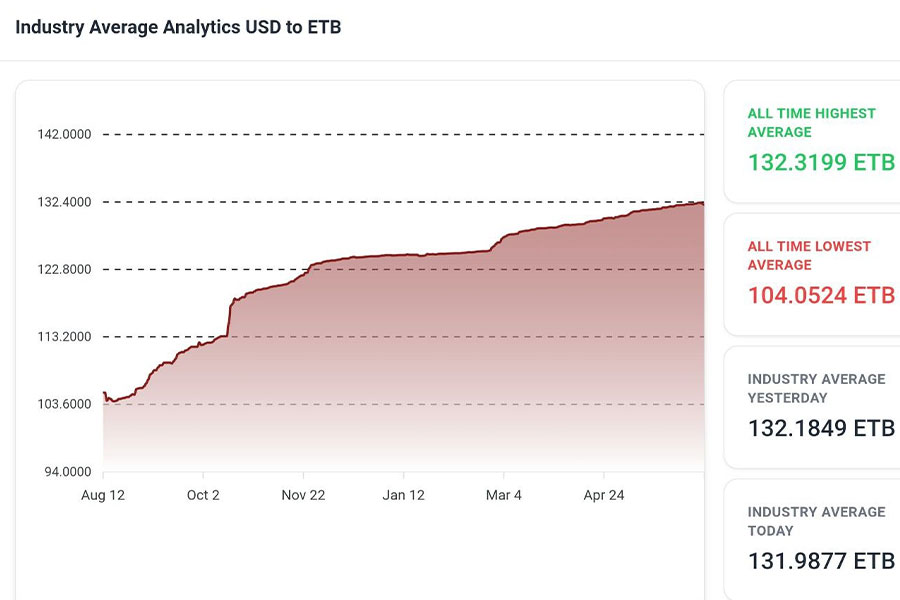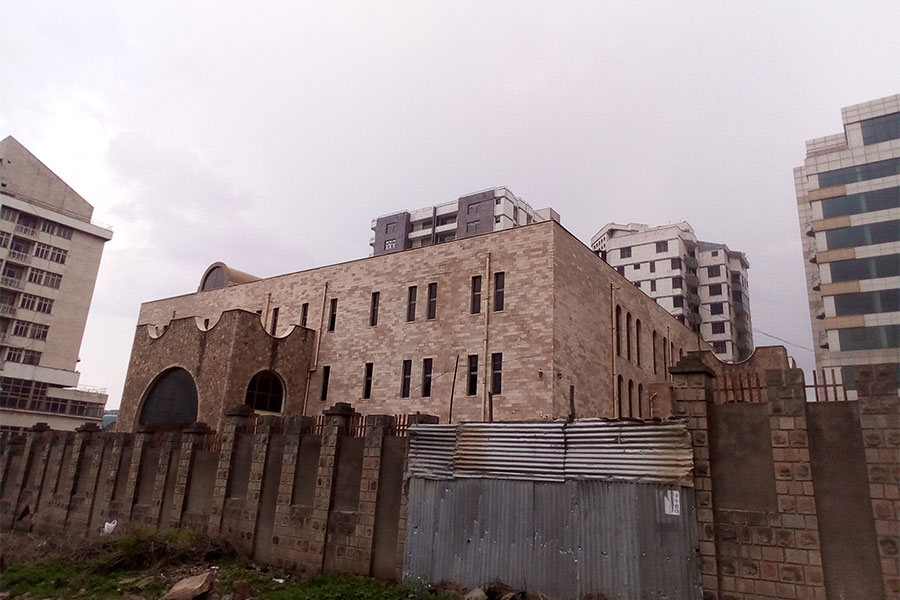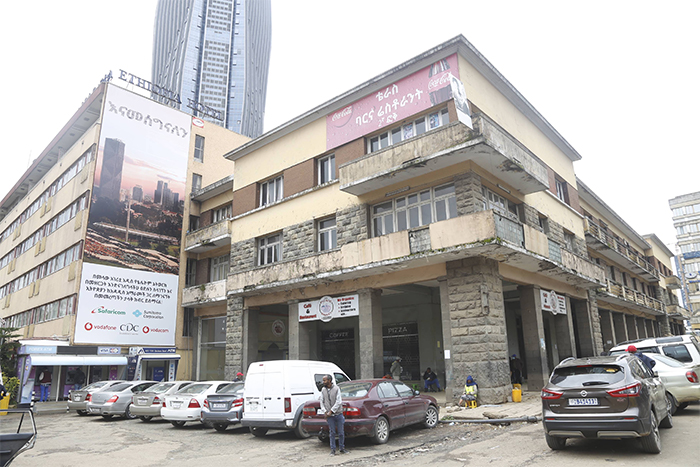
Money Market Watch | Jun 15,2025
Sep 19 , 2020
By Abdulmenan M. Hamza
Currency demonetisation is a significant economic measure, needing a clear rationale, objectives and preparation. In Ethiopia's case, the claims and objectives set out by the government and their enforcement mechanisms are questionable, writes Abdulmenan Mohammed (abham2010@yahoo.co.uk), financial analyst based in the UK.
The matter of demonetisation was raised along with limiting cash withdrawals earlier this year when the banking industry was hit by a serious liquidity crunch. Restrictions on cash withdrawals from banks and the amount of money that can be held outside the banking system was set a few months ago.
The Birr notes have been demonetised this week, and a higher denomination note - 200 Br - has been introduced. The cost of printing has been north of 100 million dollars. It has been claimed that this measure will tackle illicit financial flows, underground trading and cash hoarding. Moreover, it is indicated that the measure would bring the excessive cash circulating outside the banking system into the banking network, and may even help fight inflation, which has been a serious economic malady for a decade.
Currency demonetisation is a significant economic measure. As recently as 1998 a demonetisation of Ethiopian currency was made in reaction to the similar measure taken in Eritrea, a sovereign country using the same currency as Ethiopia. It was the right move.
This is the experience of the rest of the world as well. With bolstered security features and increased durability, gradual conversion of currency notes is commonly undertaken. For instance, since 2016, the Bank of England has been converting the lower denomination pound notes with new ones made of polymer, which is safer, stronger and cleaner.
When there is a suspicion of counterfeit money and a considerable amount of hoarded cash obtained from illegal activities, demonetisation will be undertaken to increase trust in the currency. It also helps to take “black money” out of use provided that the hoarders do not turn up to the banking system for conversion fearing the repercussions.
Currency demonetisation needs to have a clear rationale, objectives and preparation. It is also important to make sure the objectives are achievable without causing serious damage to the economy, as changing notes is enormously expensive. It may disrupt economic activities, affect small businesses and people who live in areas inaccessible to banking services, and could slow down economic growth.
A notable example is the much-hyped banknote demonetisation in India in 2016, which failed to achieve its objective - reduce illegal transactions and the shadow economy - but rather hit the poor, rural communities and informal sector that relied on cash transactions. It ended up slowing economic growth. To the surprise of many, almost every note in circulation was exchanged for the new ones, showing that it did not, in fact, disrupt illicit trading, fueling further criticism of the whole demonetisation plan.
In our case, the claims and objectives set out by the government, their propensity for achievement and the enforcement mechanism are questionable.
Primarily, it has been repeatedly heard that a considerable sum of money is in circulation outside the banking system. The way the message has been conveyed is creating the wrong impression. The National Bank of Ethiopia's (NBE) third-quarter report for the fiscal year shows that 139 billion Br was in circulation as of late March 2020. Out of this amount, 109 was outside of the banks.
In fact, determining whether this amount is excessive for a predominantly cash-based and informal economy requires analysing the long-term trend of monetary phenomena. Over the past decade, currency in circulation soared to its level of 139 billion Br from 37.5 billion Br, as of late March 2010, driven by economic growth, increased business activities, the proliferation of the informal sector and inflation.
Keeping aside the seasonal variations, the annual growth rate has been significantly fluctuating. In 2010, it increased by as high as 37pc in a year, whereas the growth rate in 2015 was as low as eight percent. In the past couple of years, the growth remained 11 percent, following the massive increase of 22pc in 2018.
Despite the significant increase in the value of currency outside banks, currency in circulation as a proportion of broad money - currency outside banks, saving and time deposits - has gone down considerably to 11pc from 22.8pc over the same period due to the increased accessibility of banking services. The data reveals that there is no unusual amount of money in circulation in the economy as believed by many.
Apart from wild guess work, there is also no credible evidence to show the size of cash hoarding from illegal activities. There is just as well no guarantee that the money obtained from illegal activities would not be laundered through the demonetisation process.
No doubt, an economy mainly defined by the informal sector requires more cash than an economy in which the main players are formal businesses, and the banking system is well developed. Even if the changeover brings more cash into the banking network, it will eventually leave the system as long as the economy remains cash-based, coming back to square one.
Another misunderstanding here is the claim that demonetisation helps to reduce inflation, which is based on a complete misreading of the inflationary phenomena and the Ethiopian monetary policy framework. Monetary theory asserts that inflation is caused by the expansion of aggregate money - in the Ethiopian context broad money or M2 (currency outside banks, saving and time deposits) - relative to economic growth. Ethiopian monetary policy tries to control broad money by controlling reserve money.
Currency in circulation accounts for 11pc of the total money, and the expansion of broad money has been mainly driven by, among other things, government borrowing from the central bank. Thus, the demonetisation of Birr notes plays a tiny part in fighting inflation.
Suggestions on the way the changeover is to be enforced are no less troubling. The government warned that those bank officials who are involved in illegal activities during the changeover would be accountable. Moreover, the license of the bank could be revoked. The army and security personnel may be able to confiscate money obtained from “illegal activities.”
Holding bank executives accountable for wrongdoing during the changeover is one thing. Threatening to revoke the license of a bank is an irresponsible way of dealing with transgressions. Banks are one of the most important institutions in the economy, and any measures taken against one of them has serious economic repercussions, which should not be taken lightly. In the modern economy, banks are “too important” to let them fail.
Allowing the army and security personnel to confiscate money obtained from “illegal activities” would also encourage the breach of the right of citizens.
The fate of people unable to have their notes exchanged before the three-month deadline should worry us as well. Indeed, if the changeover is not executed in an orderly fashion it has a high probability of disrupting business activity, particularly in rural areas. Just as devastatingly, lower-income groups that fail to exchange in time may face a threat to their subsistence livelihood.
Thus, the assertion that a central bank can choose not to redeem the notes it has issued upon request should be questioned. Even though a note is out of circulation, the national bank could redeem it at any time. Adding credence to this argument is how expensive it is to print notes. By making them no longer legal tender, hundreds of millions of Birr, paid for in foreign currency, will be wasted.
It should then be evident that the replacement of notes with more security features and durability, would have been better executed over a longer period of time. It would have been less burdensome to the economy and the printing expenses would have been stretched out over time.
PUBLISHED ON
Sep 19,2020 [ VOL
21 , NO
1064]


Money Market Watch | Jun 15,2025

Featured | Sep 08,2019

Sunday with Eden | Jun 18,2022

Fortune News | Jul 18,2021

Fortune News | Nov 05,2022

Radar | Nov 09,2024

Radar | Aug 10,2019

In-Picture | Jun 08,2025

Commentaries | Nov 21,2018

Commentaries | May 25,2019

My Opinion | 131967 Views | Aug 14,2021

My Opinion | 128357 Views | Aug 21,2021

My Opinion | 126294 Views | Sep 10,2021

My Opinion | 123910 Views | Aug 07,2021

Dec 22 , 2024 . By TIZITA SHEWAFERAW
Charged with transforming colossal state-owned enterprises into modern and competitiv...

Aug 18 , 2024 . By AKSAH ITALO
Although predictable Yonas Zerihun's job in the ride-hailing service is not immune to...

Jul 28 , 2024 . By TIZITA SHEWAFERAW
Unhabitual, perhaps too many, Samuel Gebreyohannes, 38, used to occasionally enjoy a couple of beers at breakfast. However, he recently swit...

Jul 13 , 2024 . By AKSAH ITALO
Investors who rely on tractors, trucks, and field vehicles for commuting, transporting commodities, and f...

Jul 5 , 2025
Six years ago, Ethiopia was the darling of international liberal commentators. A year...

Jun 28 , 2025
Meseret Damtie, the assertive auditor general, has never been shy about naming names...

Jun 21 , 2025
A well-worn adage says, “Budget is not destiny, but it is direction.” Examining t...

Jun 14 , 2025
Yet again, the Horn of Africa is bracing for trouble. A region already frayed by wars...

Jul 6 , 2025 . By BEZAWIT HULUAGER
The federal legislature gave Prime Minister Abiy Ahmed (PhD) what he wanted: a 1.9 tr...

Jul 6 , 2025 . By YITBAREK GETACHEW
In a city rising skyward at breakneck speed, a reckoning has arrived. Authorities in...

Jul 6 , 2025 . By NAHOM AYELE
A landmark directive from the Ministry of Finance signals a paradigm shift in the cou...

Jul 6 , 2025 . By NAHOM AYELE
Awash Bank has announced plans to establish a dedicated investment banking subsidiary...